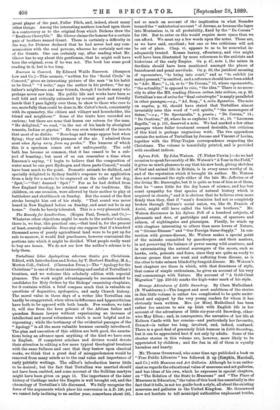Sylvan Folk. By John Watson. (T. Fisher Unwin.)—As we had
occasion to speak favourably of Mr. Watson's "A Year in the Field," it gives us much pleasure to say that his new book, giving sketches of bird and animal life in Britain, is in every sense worthy of it, and of the reputation which it brought its author. Mr. Watson does not command the style either of the late Mr. Jefferies or of the living Mr. Burroughs, but it is quite as true of him as of them, that he " cares little for the dry bones of science, and has but scant sympathy for that species of natural history which is acquired in closets.;" and it is obvious that he believes even more firmly than they, that if "man's dominion had not so completely broken through Nature's social union, we, like St. Francis of Assisi, might still have called the birds our brothers." Mr. Watson discourses in his Sylvan Folk of a hundred subjects, of pheasants and deer, of partridges and swans, of sparrows and salmon, of nightingales and ptarmigan. Finally, he winds up with chapters interesting to others than mere lovers of Nature, on " Grouse-Disease " and " Our Foreign Game-Supply." In con- nection with grouse-disease, Mr. Watson makes a special point of the mistake committed by gamekeepers and their masters, in not preserving the balance of power among wild creatures, and in exterminating the natural scavengers of the moors, such as hawks, owls, polecats and foxes, since they are quite as ready to devour grouse that are weak and suffering from disease, as is the otter to take salmon blinded by fungoid disease. Mr. Watson's best chapters are those in which, with that directness of style, that comes of simple enthusiasm, he gives an account of his very real communings with Nature. His account of " A Gold-Crest Migration" (pp. 250-53) marks the high-water mark of his style.
Strange Adventures of Little Snowdrop. By Clara Mulholland. (R. Washburne.)—The longest and moat ambitions of the stories in this little volume is rather too complicated to be quite under- stood and enjoyed by the very young readers for whom it has obviously been written. Mrs. (or Miss) Mulholland has been rather too anxious to mix up Irish with English life in her account of the adventures of little six-year-old Snowdrop, other- wise May Elton ; and, in consequence, the narrative of her life at Kelteen Castle with her cousins—and particularly her favourite, Dermot—is rather too long, involved, and, indeed, confused. There is a good deal of genuinely Irish humour in Little Snowdrop, but it can be appreciated best if not only by adults. Some of the shorter stories in this volume are, however, more likely to be appreciated by children; and the fun in all of them is equally harmless and hearty.






































 Previous page
Previous page